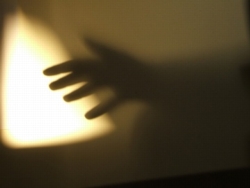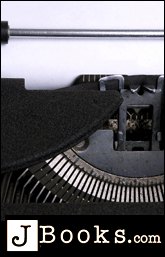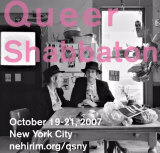 May 07
May 07
Shadow Play
by Amir Gutfreund
p. 2 of 2

When Uncle Nathan walked in he looked the same as always but slightly paler, and there was a large black yarmulke on his head. His eyes were shiny and his mouth was slack, as if he were about to make a joke at any moment. Everyone went up to him and asked how he was, they even hugged him, and said, “It’s good to see you.”
Uncle Nathan smiled cautiously.
“You’ll do a show for us today, we heard?” some people asked.
Uncle Nathan squirmed. “That’s what they say.”
After cake and coffee it was time for Uncle Nathan. They stood him, mute, opposite a big white sheet that someone had hung across the balcony. When Aunt Perla signaled that everything was ready, Uncle Nathan slowly turned to face the sheet.
He pricked up one finger and waved its shadow as if inspecting something important. Everyone watched. When would he start? We were waiting for monkeys, alligators, tractors.
“Guess what this is,” said Uncle Nathan. His voice sounded odd, and the only thing on the sheet was his single finger sticking straight up. “This is one,” he explained.
The room was silent. Everyone looked at the new black yarmulke and waited. When would the show start?
Uncle Nathan added another vertical finger. “And this?”
“Two…” some hesitant voices offered.
“That’s right,” Uncle Nathan confirmed, and closed his eyes approvingly. Then he stuck up another finger. “And this?”
“Three!” The calls came from around the room. I was calling out too now, “Three!”
“And this?”
“Four!” we all cheered.
Uncle Nathan opened his eyes, rearranged his yarmulke, and his face took on a grave expression. “For three transgressions of Israel, and for four, I will not turn away…”
“Um…what?”
“…because they sold the righteous for silver, and the poor for a pair of shoes.”
“What are you talking about, Nathan dear?” asked Aunt Perla.
Uncle Nathan concentrated and cast a complicated silhouette on the sheet. “This is Uncle Yitzhak, who for years abused little children and touched them. Ask Galia and Ami. They have problems to this day. They told me.”
A new silhouette.
“And this is half a loaf of bread. Perla will remember. In the ghetto, during an aktion, they said if she told them where the others were hiding they’d let her live and give her half a loaf.”
“Nathan dear…”
“And this is the silhouette of a man sitting with his foot in a cast. It’s Danny, whose wife Rachel put a cast on his leg before the Six Day War so he wouldn’t be sent to fight, and instead he worked at his headquarters and got a commendation for homefront contributions. Ha!”
That was all Uncle Nathan had time for, because Danny got up and lunged at him, and so did Boaz, and others joined in too. They wrapped the white sheet around him to make him shut up and hold him still, but Uncle Nathan squirmed like a white blister. He didn’t yell or scream, he just fought, as if he still had more in him. They held him down firmly and called the paramedics.

Afterwards, every Shabbat, I went with Mom and Dad to sit with the family. Every Shabbat. Anyone who didn’t come was gossiped about.
I wanted to understand what Uncle Nathan had said about Uncle Yitzhak. And about Aunt Perla. But they told me to stop – Enough, Uncle Nathan was nothing but a poor old man who had gone crazy. Aunt Perla still went to visit him every two weeks. They said she was a righteous soul. I asked her, “What happened to him? What did he say about Danny?” But she sighed. “I have enough trouble,” she said, “now you’re starting too?”
When Passover came, everyone told each other how good it was that the holiday was here, so we’d have a little peace and quiet. We all went to Holon, where Danny had announced he was hosting the seder that year.
We wore yarmulkes and mumbled our way through the haggadah, and it no longer seemed strange that Uncle Nathan was not with us, that he was in that place. Danny kept bowing his head, and I noticed that his shadow on the wall looked like a sack propped over his shoulders. Uncle Yitzhak, who hardly ever came to family gatherings anymore, put his hand over his eyes and had almost no shadow at all. I looked at Galia sitting next to her husband, singing, “Had he brought us through the sea but not sunk our oppressors in it – dayenu,” and her shadow was swaying more than she was. I looked at her and at Uncle Yitzhak. What had Uncle Nathan said? Why wouldn’t anyone explain it to me? Why wasn’t I allowed to ask?
In the end it was pretty easy to get to him. I just had to duck down in the bus for a while so Aunt Perla wouldn’t see me, and then I had to find his room.
“Teach me how to make shadow puppets?” I said to Uncle Nathan.
He looked at me silently.
“If you teach me, I’ll do what you did,” I said, and he kept staring at me.
Then he suddenly said, “We were all children once,” and he started to cry. He covered his face and the tears streamed through his fingers and down his hands, but he made no sound.
After a while he got up from his chair. He went over to the wall and began to show me, very slowly – an alligator, a monkey. Then a train engine, a fly, an umbrella.
I started visiting him twice a week. No words, only fingers, and sometimes the name of a shadow puppet – this is a clown, this is a hedgehog, this is Elijah slaughtering the false prophets of Baal. First we did the easy ones, then the tricky ones.
On the first day of summer, I announced that I was putting on a shadow play.
| Zeek’s translations of Hebrew literature are made possible with a grant from the Council of Literary Magazines and Presses, supported by public funds from the New York State Council on the Arts, a state agency. Please direct submissions and queries to arovner[at]zeek.net. |
Amir Gutfreund (b. 1963) studied at the Technion, served as an officer in the Israeli Air Force for twenty years, and retired with the rank of lieutenant colonel. His first novel, Our Holocaust [Shoah Shelanu (Zmora-Bitan, 2000)], won the Yad Vashem Buchman Prize and recently received the Sami Rohr Prize “Choice Award” (Toby Press, 2006). His volume of stories, Seashore Mansions [Achuzot HaChof (Zmora-Bitan, 2002)], won the prestigious Sapir Prize in 2003. Gutfreund’s latest novel, HaOlam, Ktsat Achar Kach (Zmora-Bitan, 2005) presents a fantasia of Israel’s founding from the viewpoints of a cast of tragi-comic pioneers. His award-winning collection and his acclaimed second novel are both forthcoming in English from the Toby Press. Gutfreund lives with his wife and two children in the Galilee.
Jessica Cohen is a freelance translator based in New York. Born in England and raised in Jerusalem, she translates contemporary Israeli fiction, non-fiction, and poetry, as well as commercial material from and into Hebrew. Her published translations include David Grossman’s 2006 Koret International Jewish Book Award winner, Her Body Knows (Farrar, Straus, Giroux, 2006), Amir Gutfreund’s prize-winning Our Holocaust, the Sami Rohr Prize finalist Accidents (Metropolitan Books, 2005) by Yael Hedaya, and Ronit Matalon’s Bliss (Metropolitan, 20003). Her translation of historian Tom Segev’s 1967: Israel, the War, and the Year that Transformed the Middle East (Metropolitan, 2007) will appear next month on the fortieth anniversary of the Six Day War. She can be reached at jessica[at]thehebrewtranslator.com.










